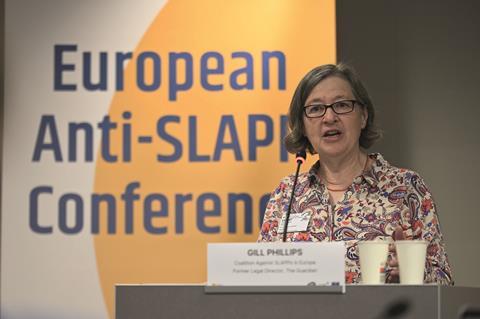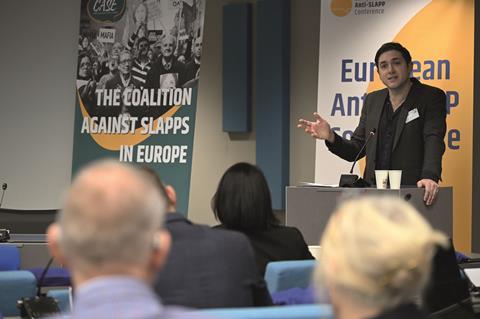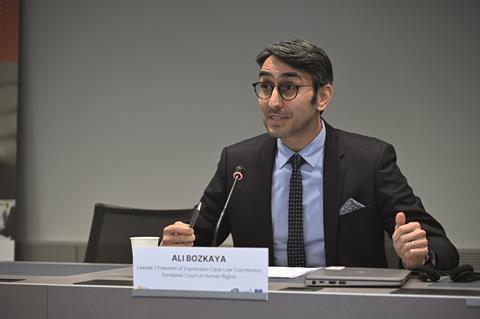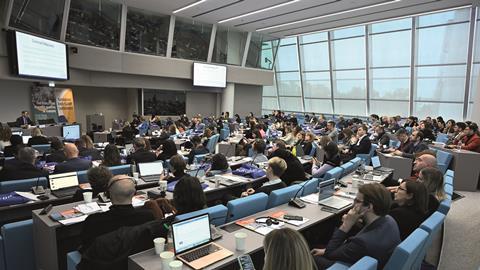As a conference in Strasbourg called for action to protect free expression, the Council of Europe has proposed a number of steps to suppress strategic lawsuits against public participation. Will such measures make it into UK legislation?
In certain rarefied circles, the term SLAPP – strategic lawsuit against public participation – has been around for decades. It was apparently coined in 1988 by two University of Denver academics as the title of a learned paper on the use of ‘civil tort action to stifle political expression’. But for everyday practitioners in the UK, its provenance is much more recent. The word’s first appearance in the Gazette came in 2021; in regulatory guidance a year later. It first went on the statute book, through the Economic Crime and Corporate Transparency Act, in 2023.
The acronym is about to become much better known. The first regulatory prosecution of a solicitor for alleged SLAPP behaviour gets under way in just over three weeks. Meanwhile, the campaign for a general UK anti-SLAPP bill (the 2023 legislation covers only SLAPPs related to economic crime) received a new boost from the prime minister last month. In a newspaper article on 28 October, Sir Keir Starmer wrote of ‘powerful people’ using SLAPPs ‘to intimidate journalists away from their pursuit of the public interest.
‘Such behaviour is intolerable and we will tackle the use of SLAPPs to protect investigative journalism, alongside access to justice,’ he said. This sentiment appears to contrast with his decision not to revive the last administration’s anti-SLAPPs measure in Labour’s first administrative programme.
Starmer’s apparent change of heart may have been prompted in part by Europe-wide initiatives, both by the EU and the 46-nation Council of Europe (of which of course the UK remains a member). The EU approved an admittedly limited anti-SLAPP directive earlier this year. Member states (with the exception of Denmark, which enjoys an opt-out from EU justice and home affairs measures) must be transposed into national laws by 7 May 2026.
'The UK cannot sit down and pretend it is outside the issue'
Gill Phillips, former Guardian head of legal
In April this year, meanwhile, the council adopted a recommendation* on countering SLAPPs, which it urges member state governments to implement ‘as a matter of urgency’. The council was among the sponsors of a conference in Strasbourg last week (pictured, above) organised by the Coalition Against SLAPPs in Europe, which heard that measures to protect free expression across the continent are badly needed. While Europe occupies most of the top positions in the Reporters Sans Frontières press freedom index (the UK is 23rd out of 180), Italy stands at 46th place, Malta at 73rd and Turkey at 158th. Legal threats come from many corners, Gill Phillips, former head of legal at the Guardian, pointed out. For example, only four EU member states have completely decriminalised defamation law.

Phillips told the Strasbourg conference that the council’s guidance, along with the EU directive, provides a model for a revived anti-SLAPP law. ‘The UK cannot sit down and pretend it is outside the issue.’
In its recommendation, the council maintains that, as well as a negative obligation not to interfere with the right to freedom of expression, states have ‘a positive obligation to ensure a safe and favourable environment for participation in public debate by everyone, without fear, even when their opinions run counter to those defended by official authorities or significant parts of the public’.
This defines SLAPPs by a non-exhaustive list of indicators (see box). ‘While SLAPPs do not necessarily include all these indicators, the more of them that are present or the more acute the behaviour, the more likely the legal action can be considered a SLAPP.’
‘Public participation’ covers the right to express opinions on matters of public interest, including those ‘which offend, shock or disturb the state or any section of the population’. Public interest, meanwhile, ‘extends to issues which may give rise to considerable controversy, but it cannot be reduced to the public’s thirst for information about the private lives of others, or to an audience’s wish for sensationalism or voyeurism’.
Recommended measures to combat SLAPPs include mechanisms for early dismissal: both to allow defendants to file applications for early dismissal and for courts on their own initiative to dismiss a claim as a SLAPP early in the proceedings. Applications for early dismissal ‘should include the right for both parties to be heard based on the adversarial principle’.
The refusal of a request for early dismissal should not have the effect of preventing the defendant from arguing again in the substantive hearing that the proceedings constitute a SLAPP.
On the potential financial burdens of SLAPP suits, the recommendations state: ‘Member states should introduce rules, in line with national law and practice’ to ensure the authorities have the power to require the claimant to provide security for costs.
‘Member states are encouraged to make appropriate provisions in their national legal systems to enable courts, on determination that a legal claim constitutes a SLAPP, to order the claimants to bear all the costs of the proceedings, including the full costs of legal representation incurred by the defendant.’ (In a UK context this would seem to knock on the head any proposal to revive the now-repealed section 40 of the Crime and Courts Act 2013, which would have made any publisher not signed up to a government-approved regulator liable to pay claimant costs even of an unsuccessful libel action.)
Council of Europe’s ‘SLAPP indicators’
According to the Council of Europe’s guidance, the more of these indicators that are present ‘or the more acute the behaviour’, the more likely a legal action can be
considered a SLAPP.
- Claimant tries to exploit an imbalance of power, such as financial advantage
- Remedies requested are ‘disproportionate, excessive or unreasonable’
- Claim amounts to abuse of laws or procedures
- Claimant engages in procedural and litigation tactics designed to drive up costs
- Claimant’s action targets individuals rather than organisations responsible for the challenged action
- Action is accompanied by a public relations exercise designed to ‘bully, discredit or intimidate’
- Claimant or their representatives engage in legal intimidation, harassment or threats, ‘or have a history of doing so’
- Claimant or associated parties engage in multiple or cross-border actions on the basis of the same set of facts
- Claimant systematically refuses to engage with non-judicial mechanisms to resolve the claim
Wherever possible within national legal systems, member states should provide for the capping of damages in SLAPP cases. And ‘where necessary and according to national legislation, member states should consider providing adequate access to free legal assistance... Member states should consider providing financial support to SLAPP victims’.
How many of these recommendations would make it into UK anti-SLAPP legislation is questionable. Certainly, the prospect of free legal assistance to civil defendants appears unlikely in the foreseeable future.

But the Strasbourg conference heard that European Court of Human Rights rulings are already creating some anti-SLAPP case law. So far, the ECtHR has not used the term SLAPP, said Ali Bozkaya (pictured below) a case law coordinator at the court, ‘but many cases cover the essence’. Examples include rulings on Article 18 of the European Convention on Human Rights (the use of restrictions for purposes other than those for which they were prescribed), the misuse of power and the chilling effect of even unsuccessful prosecutions of journalists. One case Bozkaya did not mention, presumably because it was too recent, was this month’s decision in Associated Newspapers v United Kingdom, which found success fees charged by lawyers in claims against the Daily Mail to be violations of the right to freedom of expression.

Amid all this activity, one rather important constituency needs to be brought on board: the legal profession. ‘Without the enabling role of lawyers, SLAPPs would not be a problem,’ Charlie Holt, a non-practising barrister and prominent UK anti-SLAPPs campaigner told the conference. While lawyers ‘don’t want to indulge in abusive suits... certain pernicious, and I would say mistaken, assumptions about the role of lawyers have become embedded in our profession.’
In an attempt to change the agenda, Holt revealed, the coalition’s legal working group of lawyers is compiling resources for the profession, including a comparative analysis of codes of ethics across Europe and recommendations to bar associations. An anti-SLAPPs pledge is also in the works.
More immediately, in a little over three weeks, the Solicitors Disciplinary Tribunal will start hearing the first case brought by the Solicitors Regulation Authority for alleged SLAPP-like behaviour. Ashley Hurst, head of client strategy at international firm Osborne Clarke, denies allegations of misconduct over letters sent to tax expert Dan Neidle.
Whatever the tribunal’s verdict, and regardless of whether the prime minister’s passing reference to SLAPPs morphs into action, there is no doubt that the issue of what Francophones call ‘poursuites-bâillons’ (ballistic lawsuits) is firmly on the agenda.
*Recommendation CM/Rec(2024)2 Countering the use of strategic lawsuits against public participation





































1 Reader's comment